J. Lee Thompson: Times are A-Changing

Director J. Lee Thompson about the future and past of filmmaking, and his classic movies, such as “The Guns Of Navarone” and “Cape Fear”
With a forty year history of filmmaking behind him, British-born director J. Lee Thompson has had one of the most diverse and successful careers in Hollywood and despite his considerable age of 86 years, Thompson is still keeping himself busy working on a variety of projects. Thompson directed movies that have long become such classics, such as “Cape Fear”, “McKenna’s Gold”, and “The Guns of Navarone”, which has recently been released on DVD by Columbia TriStar Home Video. Later in his career, he worked with Charles Bronson on numerous occasions and was even involved in the ingenious “Planet of the Apes” series of movies. It shows just how versatile the director is and that he was never restricting himself to a particular genre. In 1981 during one horror craze in Hollywood, J. Lee Thompson even directed the 1981 slasher flick “Happy Birthday to Me.” Though his career has had its ups and downs, Thompson continued directing until he was well into his 70s.
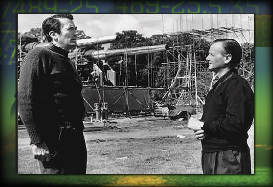 Today, Thompson still has his hands firmly in the film industry, working behind the scenes as a producer to bring various projects to life, and a number of films to the big screen, although it has been over 10 years that he last directed a movie. Asked whether he misses the active role he used to take in the creation of movies, Thompson quickly responds, “Oh yes, but I am still working every day.”
Today, Thompson still has his hands firmly in the film industry, working behind the scenes as a producer to bring various projects to life, and a number of films to the big screen, although it has been over 10 years that he last directed a movie. Asked whether he misses the active role he used to take in the creation of movies, Thompson quickly responds, “Oh yes, but I am still working every day.”
Although directing is no longer an option for Thompson, he has teamed up with a partner and runs a production company called “Capricorn.” “The last film Capricorn made was Madeline,” the director tells me excitedly, “And I currently have tow other scripts on option, so I am still very viable in the business. I keep working, and I don’t consider myself retired.”
Retirement would never be a satisfying way of living for Thompson, as he tells me, but the basic problem is that at the age of 86, it is simply impossible to find a job as a director in Hollywood. “At my age it is difficult,” he says. “In Hollywood directors are not employed at the age of 86. Which I find very regrettable, but the problem is that you can’t find insurance at that age. As long as I keep staying in the industry I will definitely keep producing. I am not in retirement, I am still working all the time.”
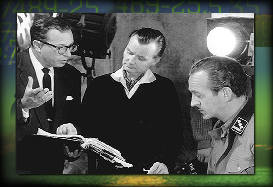 Born in 1914 in Bristol, England, J. Lee Thompson initially started out as a playwright who produced his own plays. Gradually, and over time, his role changed and he took on additional roles in the production of his scripts, until eventually he took the director’s chair for the first time in 1950 to helm the movie “Murder Without Crime,” a movie based on his own play. “I began as a playwright,” the director remembers, “and then at one point, my plays were bought for film. Since I wrote the original material, I was asked to write the screenplays as well. That was the point when I became a screenwriter. Back then I was a screenwriter with distinguished and big credits in Britain, actually.”
Born in 1914 in Bristol, England, J. Lee Thompson initially started out as a playwright who produced his own plays. Gradually, and over time, his role changed and he took on additional roles in the production of his scripts, until eventually he took the director’s chair for the first time in 1950 to helm the movie “Murder Without Crime,” a movie based on his own play. “I began as a playwright,” the director remembers, “and then at one point, my plays were bought for film. Since I wrote the original material, I was asked to write the screenplays as well. That was the point when I became a screenwriter. Back then I was a screenwriter with distinguished and big credits in Britain, actually.”
At that time Thompson was providing the screenplays for films like “The Price Of Folly” in 1937, “The Middle Watch” in 1939, “The Strangler” in 1940 and “No Place For Jennifer” in 1950, which was then followed by his directorial debut “Murder Without Crime.”
“It was another play that I produced at the time, and they wanted me to direct it, which I did” the director fondly looks back on the beginnings of his career. “From there I went on to direct other films, many of which I did participate in the script to a certain extend, although uncredited at times. Gradually, I found that directing took over all of my time and I couldn’t write the scripts any longer, which I regret in a way. It was the point when I got on films that were already written as scripts. Projects that needed to be prepared and go directly to the shooting stage.”
Spanning such a long career in the filmmaking industry, one can only wonder how much Thompson must have seen in the world of filmmaking. Technologies evolved, people came and went, the entire studio system changed during that time. According to Thompson’s view, the main difference between making movies today and 50 years ago lies mostly in their realistic depiction of events, as well as the lack of “taboos” in modern film.
“Over time, movies became more realistic,” he explains. “The romance fell out of passion entirely. One might argue whether the openness of today’s films is a good thing or not – I personally think it is good. Back in the old days, there were so many restrictions that hampered your work. I remember that I was constantly having battles with the British Board of film censors about things that today would be considered entirely “unsexy”. But back in those days, you couldn’t do what you can do today, you couldn’t show what you can show on the screen today. I do think it is for the better. I know some people won’t agree with me on that, but as a result one is getting truer films today. As an additional side effect, some films that were banned 20-30 years ago are now finally fully exploited with the help of video and television broadcasts.”
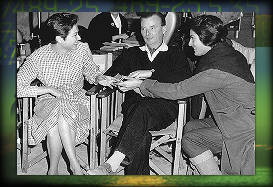 But there is much more to filmmaking than struggling with censors and their restrictions. Some of the most ground-breaking achievements that have changed the world of moviemakers entirely lies in the technical realm, and once again, Thompson is open to all the innovations that came along the years.
But there is much more to filmmaking than struggling with censors and their restrictions. Some of the most ground-breaking achievements that have changed the world of moviemakers entirely lies in the technical realm, and once again, Thompson is open to all the innovations that came along the years.
“The technical advances that were made during that time are astounding. Things are done differently today and these advances help – as long as the subject matter is good, of course.”
“The industry has always been experimenting with new technological ways of improving the visual picture,” Thompson reminisces. “And again, that’s fine. I mean, 20 years ago you wouldn’t have been able to make a film like “Dinosaur.” Technology is always advancing and obviously that’s good. I even agree with the new digital ways of filmmaking, where you don’t even have physical film in the camera, but to be honest, I wouldn’t want to use it.”
The resentment towards that particular evolutionary step has nothing to do with the quality of the resulting image, or the lack thereof. For the seasoned filmmaker, it is a very important element of the craft to actually feel the material and to hear it roll through the camera. “To me it is special to have film in my hands, physically,” Thompson explains to me. “What I always loved was being in the editing room and film going through a Moviola. You are stopping it and you are feeling the film itself. All that has gone. Today, it is all done with computers on multiple screens and often times, digitally. I am not sure if that is an improvement necessarily. Great filmmakers like David Lean, they needed film. They needed the feel, they needed to be able to stop it on the exact right moment in the Moviola. On the other hand, I feel the digital age is a big technical improvement, and obviously it is much quicker. Today, you can cut much more film in far less time, and you can see your multiple choices at the same time on different screens. That is an advantage!”
With the digital age, suddenly also came the opportunity to restore old footage, and at the same time possibilities opened up to pick up work on older movies once again. George Lucas’ re-release of “Star Wars” with newly integrated computer generated images is the prime example for this. Given the opportunity, I was wondering if J. Lee Thompson ever felt the urge to revisit his own movies, like “The Guns Of Navarone,” to work or enhance them in one way or another.
“That’s a good question,” he says thoughtfully. “I don’t quite know how to answer that. I don’t think I really would. I love the anti-war sentiments of “The Guns Of Navarone” and I was very fond of all the characterizations. I think in a way, it got a classic collection of characters. I don’t know if I would want to meddle with it. Even if, I can’t really say I would do anything differently.”
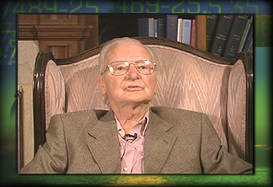 Nonetheless, Thompson knows that none of his films is absolutely flawless or perfect. But in an overall notion, he simply feels he did the best he could at the time. “I don’t believe any film I did is perfect and could have been done better. I mean, in general, I would not meddle with it. In every film you detect something when you see it again and you think to yourself, if I got the chance to shoot it again, I would do this in a different angle, I would have the actor do this scene it again, and so forth. But I think that is completely natural.”
Nonetheless, Thompson knows that none of his films is absolutely flawless or perfect. But in an overall notion, he simply feels he did the best he could at the time. “I don’t believe any film I did is perfect and could have been done better. I mean, in general, I would not meddle with it. In every film you detect something when you see it again and you think to yourself, if I got the chance to shoot it again, I would do this in a different angle, I would have the actor do this scene it again, and so forth. But I think that is completely natural.”
Down those same lines, many of Hollywood’s most classic films are regularly subject to remakes. Updated versions that either try to establish the same theme and story in today’s world, or simply an attempt to retell a proven story with today’s technical possibilities. “Guns Of Navarone” is certainly a film of such classic caliber, but Thompson is thankful that no one was really interested in remaking this particular film. “Today, with everybody remaking films, thank God, it hasn’t been picked up for a remake.”
During his career, Thompson was also involved in two parts of the “Planet Of The Apes” series. He directed the last installment in the series, “Battle For The Planet Of The Apes”, as well as its prequel, “Conquest Of The Planet Of The Apes”. With the upcoming release of these films on DVD through 20th Century Fox home Entertainment, Thompson is excited about the prospect to make these films available to a new generation of film fans. “Like some of my other movies, “Conquest Of The Planet Of The Apes” is also a very political film, and many critics still consider it even the best of all the Apes movies, because it conveys a series of political viewpoints. Of course “Battle For The Planet Of The Apes”, was just a film for kids and didn’t have any deep meaning. I enjoyed making them both, though.”
Thompson’s affiliation with the stories surrounding the “Planet Of The Apes” series goes much deeper as one would initially think. It turns out the director actually had his eyes on the property, even before Franklin J. Schaffner and his crew tackled the subject. “I was originally planning to do the first film in the series,” Thompson tells me. “I had optioned the rights, but when it was time to start working on the project, I was off to do some other film and I couldn’t jump on that project. So I lost the rights to it. Which I regret immensely looking back now,” he adds with a hearty laugh.
During its original theatrical run, “The Guns Of Navarone” was not greeted by enthusiasm alone. It faced harsh criticism as the political voice the film had, didn’t sit to well with many of the movie’s critics at the time. Only over time it became the classic it is recognized as today, but Thompson shrugs those sentiments off easily, not bothered by the unjustified criticism. “It was an anti-war film and this was made very clear in many scenes. The film got some serious criticism back then, mostly because of the way we portrayed the NAZIs,” Thompson recalls. “A fair amount of critics didn’t like the politics in it. It was first shown in 1961 and it was some 15 years after the war. At that time, it was still felt that all the NAZIs should be considered very, very evil and some critics resented the fact that the heroes of Navarone showed sympathy for them, showing that they were all humans. It is always hard to bring out a film when an adventure story is also based on anti-war sentiments. The heroes have as much empathy for the enemy as they did for their own country. It’s always a little risky to bring politics into a roaring adventure story. And “Guns of Navarone” was full of anti-war politics, which I loved. It made the film distinguished and is one of the reasons why today, it is still a movie people enjoy and respect.”
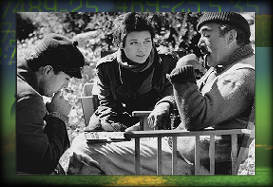 Although he is not a DVD aficionado – at this time J. Lee Thompson does not own a DVD player himself, but is fascinated by the technology and plans to buy one very soon, especially since “Guns Of Navarone” turned out so spectacularly on the release. Although of extremely good quality in its presentation and spiced up with a number of exciting extras, much of the appeal of the release stems from the fact that Thompson contributed a running length audio commentary to the DVD. It was his first excursion into the territory of audio commentaries, an excursion he very much enjoyed, especially since revisiting the film in such detail brought back many memories that had been slumbering just under the surface of rememberance. “It was the first commentary track that I ever did,” Thompson explains with audible excitement. “It was somewhat difficult at first. I hadn’t seen the movie for a long time, and I gradually fell back into it only gradually. But it was a nice feeling. When you haven’t seen your own work for a long time, doing such a commentary track is quite a novel experience. Well, I apparently enjoyed making “Guns of Navarone” and it was so full of very happy memories. The cast was wonderful and the film also was a subject dear to my heart.”
Although he is not a DVD aficionado – at this time J. Lee Thompson does not own a DVD player himself, but is fascinated by the technology and plans to buy one very soon, especially since “Guns Of Navarone” turned out so spectacularly on the release. Although of extremely good quality in its presentation and spiced up with a number of exciting extras, much of the appeal of the release stems from the fact that Thompson contributed a running length audio commentary to the DVD. It was his first excursion into the territory of audio commentaries, an excursion he very much enjoyed, especially since revisiting the film in such detail brought back many memories that had been slumbering just under the surface of rememberance. “It was the first commentary track that I ever did,” Thompson explains with audible excitement. “It was somewhat difficult at first. I hadn’t seen the movie for a long time, and I gradually fell back into it only gradually. But it was a nice feeling. When you haven’t seen your own work for a long time, doing such a commentary track is quite a novel experience. Well, I apparently enjoyed making “Guns of Navarone” and it was so full of very happy memories. The cast was wonderful and the film also was a subject dear to my heart.”
The dramatic increase in quality and availability of home theater equipment in recent years makes it possible to watch movies within your own four walls at a level of quality that can in cases exceed the presentation quality seen in movie theaters – although not the spatial scope. Interested to see whether J. Lee Thompson thought that the dawn of the digital home theater could potentially mean the end of the movie theaters as we know them, I wanted to know if he believes home theaters will eventually keep people from visiting move theaters?
“No, I don’t think so,” he is quick to reply. “I may be wrong of course, but I think people will always want to go out – young people anyway.”
However Thompson brings up an interesting point, remarking that there will be a much stronger separation between what people watch in theaters and what they prefer to watch at home. We all have certainly had that notion before, watching a movie’s trailer and deciding to wait until it becomes available on DVD rather than going to theaters to watch the film. “I think people won’t go to see trashy films in movie theaters, and I think it will affect the cinema in that way,” Thompson points out. “The films people will go to see have to be very special films, to really pull people out of their living rooms. But I think the cinema-going habit in general will continue to exist for many, many years. At the same time, it is of course wonderful that all the innovation is coming into the home, and it is very rewarding to watch films that way.”
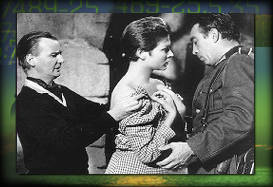 Now that “The Guns Of Navarone” has seen such a glorious rebirth on DVD through Columbia TriStar Home Video it is time to look into the future for other films the director has created. Thompson was actually able to confide in me that Universal Home Video seems to be working on a DVD release of his movie “Cape Fear.” “I believe Universal is working on it,” he tells me secretively. “I remember that I had to give an interview for the DVD some time ago. But the way I see it, they try to push more for the Martin Scorcese version, although I think it was not a very good remake.”
Now that “The Guns Of Navarone” has seen such a glorious rebirth on DVD through Columbia TriStar Home Video it is time to look into the future for other films the director has created. Thompson was actually able to confide in me that Universal Home Video seems to be working on a DVD release of his movie “Cape Fear.” “I believe Universal is working on it,” he tells me secretively. “I remember that I had to give an interview for the DVD some time ago. But the way I see it, they try to push more for the Martin Scorcese version, although I think it was not a very good remake.”
Just as with “The Guns Of Navarone,” Thompson vividly remembers the production of the film and he tells me that he feels it is a highlight in his long-lasting career. “Cape Fear” is one of my favorite movies. I hope I don’t sound arrogant or pompous saying this because I really don’t mean to, but in “Cape Fear” I managed to take a fairly ordinary little thriller and I did manage to turn it into quite a classical thriller. It’s difficult to explain for me, but in making it, I felt that I got just the right view on the subject – the darkness and look of the film and so on. I described to the cameraman how I want the settings and shadows, and his expertise was simply brilliant. I achieved most of what I had set out to do, which is really very rare. Although it was a small picture, the characters, and Robert Mitchum as Max Cady in particular, give a very classical interpretation. Over the years it has become a film that is very popular with revival houses and so on, and it is still playing. I feel very gratified by that, and when I was making it I felt that I was achieving most of what I said I would.”
Without a doubt, J. Lee Thompson has been a trailblazer in the world of motion pictures and he has brought us many suspenseful and entertaining movie moments that have been unforgotten for decades. With a release of “Cape Fear” and the “Planet Of The Apes” box set on the horizon, we can only hope that more of Thompson’s work will be made available to DVD fans around the world soon.

Leave a comment
You must be logged in to post a comment.